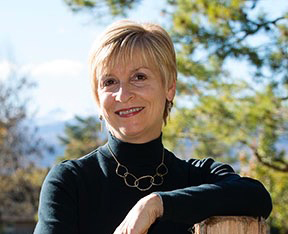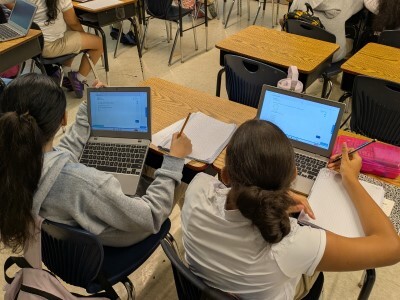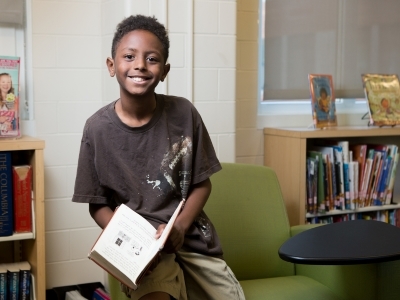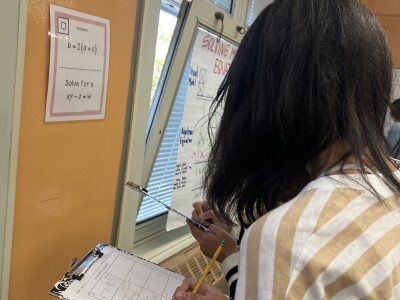Not Your Grandfather's Vo-tech
Topics
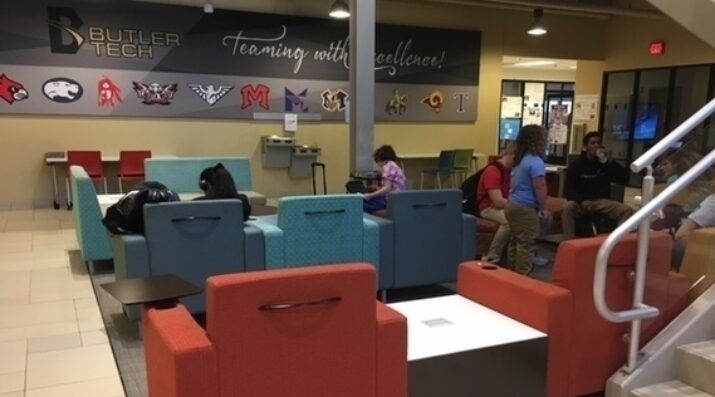
We’ve all had the experience of truly purposeful, authentic learning and know how valuable it is. Educators are taking the best of what we know about learning, student support, effective instruction, and interpersonal skill-building to completely reimagine schools so that students experience that kind of purposeful learning all day, every day.
Practitioner's Guide to Next Gen Learning
A new generation of Career Technical Education (CTE) schools like Butler Tech Bioscience Center in Ohio provide all students with the kind of learning they need in today's world.
I went to a high school that had a vo-tech program, but I didn't know anything about it. I thought that's just where boys went to work on cars.
–Dr. Abbie Cook, principal, Butler Tech Bioscience Center
Career Technical Education (CTE) has been a part of public education for over a hundred years. In earlier days, it was often called vocational technical education, or vo-tech, and its mission for much of that time was to prepare students for careers that did not require a college degree. Between 1990 and 2010, as public education priorities—and funding—focused on enrolling all students in four-year colleges and universities, CTE suffered a significant decline.
In this last decade, however, CTE has experienced a renaissance, remaking itself to align with how students learn best, as well as with the skills, knowledge, and capabilities they will need in the careers of the future. If you walk into a CTE school today, you may still find something that looks like a high-tech version of auto shop, but you are just as likely to see students in scrubs performing CPR on a robot, dancers in unitards rehearsing for a public performance, or young people ensconced in comfy chairs crunching statistics on their laptops. Or you may see empty desks, because the class is out in the field for the day, experiencing real-world learning on the campus of an industry partner.
This edition of Friday Focus: Practitioner's Guide to Next Gen Learning takes a look at Butler Tech Bioscience Center, one example of this new generation of CTE models. Butler Tech is part of a five-campus career technical planning district that serves high school students and adults throughout Butler County, Ohio. Butler Tech Bioscience Center provides juniors and seniors with a rigorous, personalized, blended learning experience in four career areas: PLTW (Project Lead The Way) Biomedical Science, Dental Science, Exercise Science, and Healthcare Science.
For this story I visited Butler Tech and spoke to Abbie Cook, the school's founding principal, about their model, including:
- Why students need the kind of learning Butler Tech offers
- How Butler Tech's CTE model differs from both traditional public schools and vo-tech programs of the past
A Bridge to the Future
Thinking about possible careers should really be starting in kindergarten. By the time they get to high school, students may not want to hear about this from their parents, and if their school isn't talking to them about it, then it doesn't happen. That's a terrible disservice to students.
–Abbie Cook
Abbie describes herself as "a huge proponent of public education," but she also identifies problems. One of these is a failure to keep pace with the changes taking place in the world students will soon enter. "We haven't changed our model in any disruptive way," she asserts, "and we don't match what is needed in the workplace today." In contrast, she says, Butler Tech acts "as a bridge to the future."
Part of this mission is fulfilled by offering a wide array of career-focused learning experiences--including coursework, hands-on laboratory experiences, job shadowing, and internships with local healthcare and pharmaceutical industry partners like UC Health West Chester Hospital, Atrium Medical Center, and AstraZeneca.
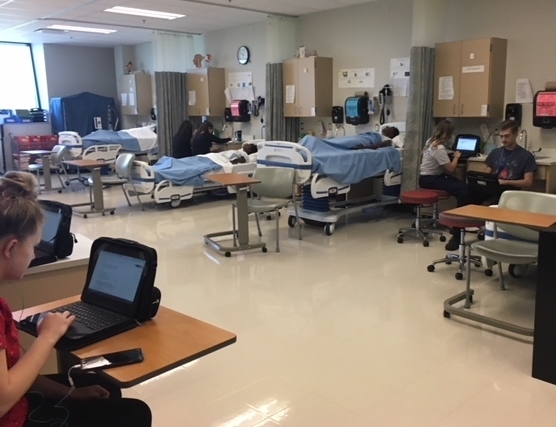
Students are encouraged to explore careers in deep and authentic ways and to make the most of opportunities to act as apprentice adults. Signs on the school's walls remind students to "fill their plate" and load up on learning opportunities, a key message at Butler Tech. According to Abbie, learners take this to heart, building personalized learning pathways that not only fulfill rigorous high school graduation requirements but also earn them college credit—a student could earn as many as 60 credits over two years--and/or certifications for careers as a State Tested Nursing Assistant (STNA), pharmacy tech, phlebotomist, athletic trainer, and certified dental assistant, among others.
Another pillar of the Butler Tech program is student agency. According to Abbie, "too many schools are extremely rigid. Students move from bell to bell, and they are told, 'You have to stay seated. You have to walk down one side of the hall.' It's not doing students justice to have so many rules. It's not preparing them for life." Butler Tech's personalized, blended learning model, she explains, provides students with choices and flexibility on a daily basis, such as when and where they work on their academics or how much time they spend on a given subject, as well as longer-term decisions regarding which career paths and credentials they wish to pursue.
The Butler Tech facility, which resembles a modern workspace, supports this kind of self-direction. Students can choose to work in the commons, an open and flexible learning space shared by students and educators, collaborate in adjacent "huddle rooms," or settle into a secluded chair, depending on the task or how the individual student learns best.
Traditional schools, Abbie observes, are often "adult-minded rather than student-minded. We offer some structure at Butler Tech, but students have a lot of decision-making ability. We need to trust our students and give them opportunities. We can't tell them when to go to the bathroom and then expect them to succeed in the adult world."
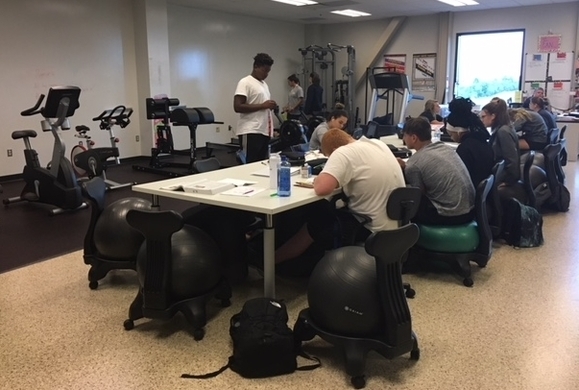
The New Face of CTE
Vo-tech programs of the past were often criticized for their low expectations of students. Abbie acknowledges some truth to this perception, recalling her time as a district curriculum director in 2006, ten years before Butler Tech Bioscience Center opened its doors. Back then, she says, "Rigor was not where it should be, and the partner districts sent lower-performing students [to CTE programs] as a last chance, an alternative to dropping out."
Today, Abbie reports, students describe the Butler Tech program as more challenging than some of the associate schools they attended as freshmen and sophomores. Data, including ACT and other test scores, numbers of college credits and certificates earned, and the volume of opportunities students are choosing to access, show that the program is strong and continuously improving. What's even more powerful than the data, Abbie says, is watching the students' faces. "They are engaged and they want to be here. We have very few discipline issues. I can walk around any time of day, and I barely have to redirect anybody."
Coupled with vo-tech's reputation for low expectations is the widely held belief that these programs were designed to train students for jobs that did not require a college degree. In practice this often led to sorting young people—especially low-income students—into vo-tech as a non-college bound track. According to Abbie, the career pathways were "somewhat based on socio-economic status in the past."
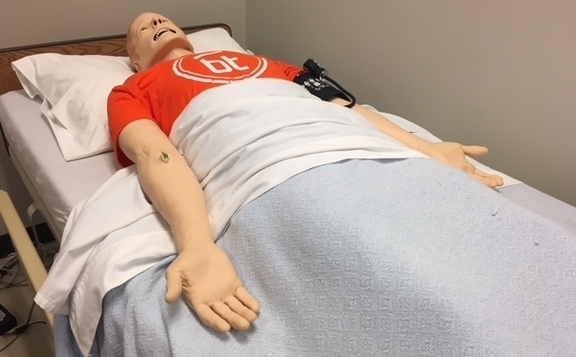
Unlike traditional vocational programs, Butler Tech serves a diverse community of learners with a wide range of career goals. "It's so different from the past," Abbie says, "and the opportunities are attractive to all students." Some students at Butler Tech, about 10 to 15 percent, Abbie reports, are working to obtain certifications for skilled jobs that do not require college, such as phlebotomy technician or dental assistant. However, over 60 percent are planning to earn four-year or advanced college degrees, aspiring to careers as registered nurses, biomedical engineers, dentists, and psychologists.
Butler Tech's approach, with its emphasis on flexible pathways into adulthood, aligns well with current research into what students need to thrive in a world of change. As captured in NGLC's MyWays Student Success Series, "the wayfinding decade between high school and established, successful adulthood is longer, tougher, and less linear than it has ever been... Navigating this new work/learn landscape involves complex, high-stakes, life-defining decisions that begin in high school."
Instead of concentrating on short-term goals and well-defined, linear pathways, next gen educators, like those at Butler Tech, think of students as adults-in-training and embrace their role as guides through that challenging wayfinding decade after high school. Whatever pathway learners choose, Abbie states with pride, they are set up for success. "Butler Tech's students are 'on it.' It makes you know everything is going to be all right. If these kids are going to be taking care of me when I'm old, I'm really all right with that."
Resources
- This Health Science course options graphic depicts the various pathways, courses, and capstone experiences and credentials Butler Tech Bioscience Center students can choose from in their junior and senior years.
- Butler Tech Bioscience Center's blended learning model and innovative use of space are featured in this brochure.
- Candidates applying to Butler Tech are required to demonstrate knowledge of and interest in their preferred field, as shown in this interview rubric for the Project Lead The Way Biomedical Science program, which also assesses students' professionalism, critical thinking, grit, and growth mindset.
- Seniors in good standing have the opportunity to participate in the Butler Technology and Career Development Schools' Early Placement Program. As explained in this handbook, this program supports eligible students to replace career-technical laboratory classes with related on-the-job work experiences.
- This By the Numbers graphic provides an overview of programs, participation, and other data for the middle and high schools that make up the Butler Tech career technical planning district.
- "Wayfinding Abilities for Destinations Unknown," Report 10 of NGLC's MyWays Student Success Series, presents research on why schools need to support learners to develop wayfinding skills for learning, career, and life, along with principles and resources for implementation.

